
Reboot10 Transcript

Hello, My name is Brian and I am going to be talking about Freeloaders today. When I learned about the theme for Reboot this year was free, instantly the first thing that came to mind was that people were going to be talking about free speech, free beer, free hardware, stuff like that. So I thought, is there a way to take the word free and sort of present it in a negative context? The only instance I could come-up with for free being a negative term was freeloaders. Then I thought, well iI really don't want to talk all about negative topic this whole time, so figured maybe iI could spin this and talk about how freeloaders and how they are a benefit. So hopefully today, I am going to show you instances of how freeloaders can help your service, help your community and make it a better place.
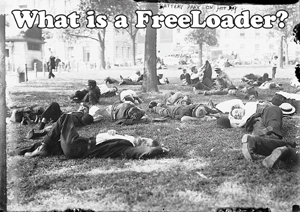
1:24 First, we have to define what a freeloader is. They are the friends that call you up and say, "I going to be in town next week, do you mind if I stay at your place for a few days", "ah that's fine". You know, three weeks later, you have an empty fridge and they are still sleeping on your couch. These are the sort of people who come in and live off you. Now normally, we think of freeloaders as some sort of parasite they're sucking your energy. This could be sucking your time, monetary or some value from you, but I want to think of freeloaders in a slight different context, something more of a symbiotic relationship. So there is some sort of symmetry between you and the freeloader, or your service and the freeloader. So this means, while your service is providing something to them, they're also providing something back to you.
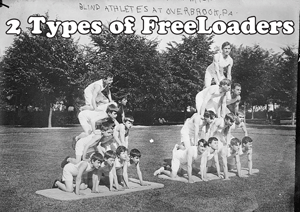
2:08 So I have tried to identify two types of freeloaders. This is far from all the possible definitions, but I want to focus on two. So I'm going to talk about freeloaders who use the system all the way to its full potential without paying for it. So This is using every feature, every little nuance of the system, but when it comes to having to pay, they just don't do it. The second type of freeloaders use the system to its full potential, then hits that wall as well, but instead of paying for it, they find some sort of sneaky way around it. So maybe they setup a second account or sign-up with a different email address, or something like that. So I am going to go through some examples of different systems and how each type of freeloader plays out.
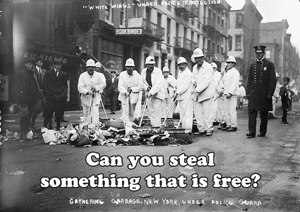
2:50 First, I want to talk about something friends and I were talking about. Can you actually steal something that is free? That's an important thing, because if you think about it we have to define what is stealing, what is theft. Usually theft is when you depriving someone else of something. It is quite a hot topic, if I take an MP3 from someone else and copy it, is that theft? cause I haven't deprived them of the other work, they still have access to it, but I've got a copy now as well. Obviously there are problems upstream because the author doesn't necessarily get the attribution they need. But if we think about that in other ways, everyday I get a newspaper stuffed through my letterbox and the newspaper is free. Now if I went around and followed the paperboy and took every newspaper as he dropped it off technically I'm stealing but the newspaper was free in the first place. So are the people really out anything? It is an interesting thing, I think you can actually steal something that is free. Which bring us to how this will work in with our freeloaders.
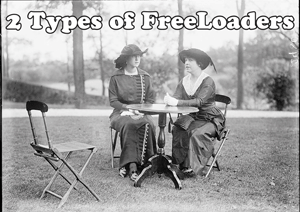
3:56 Let's go back to our two types of freeloaders again. The first example of someone who uses the system to its fullest potential without paying for is something like SKYPE. Now I'm going to use SKYPE a couple of times in different examples. But with SKYPE I can sign-up, I can use SKYPE, I can make other VoIP calls to other SKYPE members for free. I haven't read the terms of service, but it is conceivable that I could make a phone call for 24 hours a day, 7 days a week, 365 days a year. So I am using their system, but I'm not paying for it. The way SKYPE works is that it is very a la carte, so if I want to make a SKYPE out call I pay for it, so you are actually paying for services on top of the basic. So this leads that you can only really be the first type of freeloader, which just uses it to its fullest extent, there is no way to cheat the system, because if you signed-up for a second SKYPE account, you still can't make any SKYPE out calls, you just have the regular basic package. Now the other one I want to talk about is Flickr. Flickr is another interesting sort of system that we can freeload off of. Now for the longest time I was never a Flickr Pro member, it was never a big deal. But I've friends who will upload their 199, 200 photos and they'll hit that maximum. So instead of paying they'll just open-up a second account. So then you get 200 more pictures. So Flickr has introduced some arbitrary artificial limitations, why they choose 200, I don't know. It's useful enough, but not particularly useful. If you get a Flickr Pro account, you get unlimited uploads, unlimited bandwidth, you also get a few extra things like video and stats.
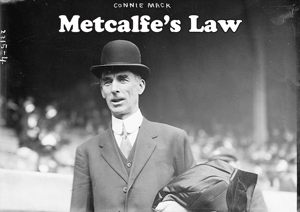
5:44 Let's talk a little bit about Metcalfe's Law, I had to write this down. The value of the network is proportional to the square of the number of users. So the more users you have in your system the more valuable the system is. This kinda goes back to the FAX machine. Who was the first person to buy a FAX machine? Who is he going to send a messages to? It's completely pointless. The FAX machine only works because there are more and more FAX machines out there. So really it is about potential. It is about the number of potential people you can connect with. My cell phone has probably about 10 or 15 people in the address book. So you would think that I can only call about 10-15 people, but that's not rue because there is the potential to call anyone in the world who has a cell phone. Billions of people I could potentially call. This is important because there could be lots and lots of freeloaders who don't necessarily make calls, or interact with your system, but they have potential that they can be contacted. So they become part of that square, the exponential growth which adds more and more value to your system.
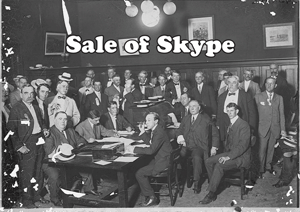
6:51 So let's talk about talk a little bit about SKYPE again. When SKYPE was sold a couple years ago, it was sold for 4.1 Billion dollars. When we divide that by the number of users, it was roughly about $50 per user. So if we look at that in terms of potential freeloaders, that $50 included the people who weren't using the system on a regular basis, so it makes your product even more attractive as your user base gets bigger and bigger.
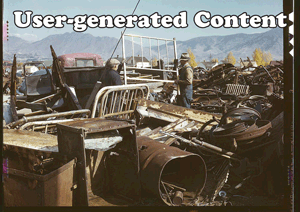
7:24 So we went back to User Generated Content. Content is one of the most expensive things to build and to create. When ever we do work for clients it is always, they give us the photoshop templates or the HTML and we put it into the content admin and we make it all nice and ready to publish, but where's the content? They never seem to have the content. So if we look back at the Flickr example, of you hit your wall of 199, 200 picture and that's it. Now you can either pay for it, or open a second account and abuse the system. Flickr shouldn't really care if you open a second account, because you are actually generating more and more content for them. Like I said, for a long time I was never a Flickr Pro user. One picture I have in my list is some graffiti of some guy showing how to tie a bow tie. For the longest time I think it was the #1 search result in google for image search for "how to tie a bow tie", that drove something like 17,000 unique visits to flickr from that picture. So by me being a freeloader off of Flickr, it has gotten into Google, it is gotten ridiculous amount of search results. If they were selling advertising around that, that is 17,000 visitors that I brought to Flickr for free. So by me opening second accounts, being a freeloader now I have 200 unique URLs, now I have 400 unique URLs that's a lot of Google juice. That's a lot or random keywords that I am starting to put into Google. If Flickr sells ads around that, I am adding more and more value to their system, giving them to ways to convert money off of it. Also, me just being a freeloader, I'm a Flickr member, I can comment on other people's pictures. The more and more I comment on other people's pictures and surf around, send links the more and more traffic I am creating for Flickr or other services, the more value I am creating.
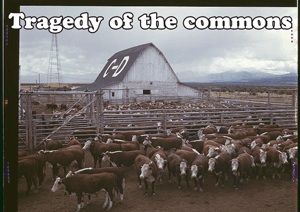
9:33 So This morning Mr. Reingold talk a little about the tragedy of commons. This is usually display or talked about as a field. So imagine we have 10 farmers, each farmer has 1 sheep. So they put 10 sheep out into the field and The field can sustain 10 sheep happily. Anything more and the field starts to going downhill. So one farmer says, well, if the field can handle 10 sheep, I'm only putting 1 out there, I'll going to graze 5 sheep. Now 5 plus the other 9 equals 14 and the field's overgrazed. The other farms say, wait a minute, if he's doing 5, I'm doing 5, and pretty soon it escalates, its also sometimes it is called the race to the bottom and everything becomes horrible and the commons are ruined, because everyone gets greedy. So you would think that freeloaders act somewhat in the same way, that the more and more that freeloaders use the system, the more that's going to ruin the commons. But this isn't always true. Its true in the physical world, but not necessarily in the digital world. If we look at something like Moore's law, the cost of hardware is becoming less and less, the cost of bandwidth is becoming less and less. Your gmail started out at 2 Gigs, now it is up to 6 Gigs of storage. So The amount of information we can store is becoming closer and closer to zero for cost, whereas we saw exponentially, the more people we add into the system the value goes up the other direction. So in the digital world, the tragedy of the commons isn't as big of an issue.

11:02 So I'm going to run through some examples of services that are out there and how freeloaders are effected by this.

11:12 First I want to talk a little bit about mailing lists. I know David Weinberger talks about this as well, so I'm just going to touch it a little bit, but on a mailing list, the equivalent of a freeloader would be someone who lurks on a mailing list. All they do is listen in on conversations, they're freeloading off our knowledge, they're getting answers, and they are learning things and they haven't contributed. But the one time that they do contribute it makes the list smarter than the smartest person. David, maybe he'll talk about this later, the smartest person on the list no matter how smart he is, if anyone corrects him, the list become smarter. So if you were really hard-core and said, OK, these people haven't posted to the list in 60 days so we're going to kick them off for being inactive. You are really ruining your list and the potential that it could be smarter. So if we look at Moore's law again, it costs you almost nothing to store an extra person, it cost you almost nothing to send an extra email. It is well worth trying to keep as many people on your list, even if they are freeloaders, as possible.

12:21 Bit torrent, this isn't a perfect example, because if you are contributing to bit torrent, you are usually seeding and that means that your not a freeloader. As your are downloading files, you are also acting to pushing them around. So in many ways you are being a freeloader as you are downloading information.

12:40 So can anyone else think of any more? I've got more on the slides, so I know more are out there. Wikipedia is another example, much like the mailing list, I've got a wikipedia account. I watch a lot of pages, but I don't necessarily contribute. So if wikipedia were to suspend my account after 6 months of use they would lose my potential to donate and help the system. So it is in their benefit to keep these freeloaders. Can anyone think of more examples? (comment from the audience) Those are good examples as well, because those sort of fall under the same trap as Flickr, they've introduced arbitrary levels, so with backpack, you can only create 3 wikipages, or 3 pages like that. Then they try and get you to upgrade. The problem with that is that I can simply create a second account and share the pages in between. one of the things to keep in mind is that if you want people to pay, and you should always try to promote freeloaders to paying customers, but your never going to convert everybody and that's OK. for the people you want to convert, you should worry less about the limitations, don't try and put artificial boundaries, but put more in features. Because much like the SKYPE example, I can open as many accounts as I can or want to, but I still can't make SKYPE out calls. And much like the basecamp and backpack, if I wanted infinite wiki pages, I just create infinite accounts. But that would be one, that's a bit of a closed system so that's difficult to contribute in any way, but much like the SKYPE sale issue, you can, they have a larger user-base, then it makes them more worthwhile or most costly if they want to sell, more attractive for other people. (comment from the audience) the more people you get into your basecamp, then the value of the basecamp goes-up because you've got more contributor to your project. can somebody think of another example? (comment from the audience) For those of you who might not have heard, he was talking about the Radio Head, In Rainbow's example. Where they released the CD for pay or free. Again, the freeloaders were probably the ones who were talking about, look at me, I just took the Radio Head album for free. Then people say, Oh, I didn't know there was a new radio head album. So in many ways your freeloaders are giving you free advertising and generating more visits, more revenues, for potential sales customers.

15:37 YouTube, this is one of the examples that kinda goes back to the SKYPE issue, I can view YouTube, I can surf youtube for free, I don't have to pay a thing. So I am freeloading off their system. Some of the ways that I generate value are comments. I can add comments to videos. But I think the most important one, and the least talked about is actually the ability to embed youtube videos on your own site. I'm not sure how easy it was before youtube to take a video from somewhere else and put it on your own blog. What this has done, it is basically freeloading off youtube, you're using their bandwidth, you are using their content, and really, unless your savvy you don't realize it is a YouTube video. So what value does YouTube get from this? Well, the fact that there are more and more videos out there becomes kinda a network effect, and I'm not sure, when they were sold to Google that the price wouldn't have been nearly as high if [YouTube] hadn't been as popular and I think what drove the popularity is, I think, the ability to embed the videos on your own site.
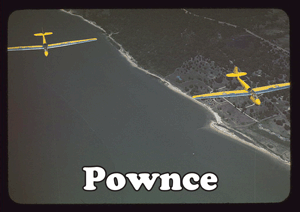
16:41 Pownce, I don't know if anyone is familiar with this one. This is a client very similar to twitter in the sense that you can post little short messages, microblogging, but you can do a few extra things, like post about events, you can also upload files, and this comes back to the artificial limitations, because for a long time there was a 10 meg limit. So if you wanted to upload any files over ten Megs they asked you to pay for a pro account. So the way to get around that is to zip it up and slip it into files less than 10 Megs and upload each one. So people are always going to get around this. So what could pownce do? Pownce could kick those people off for sneaking around, but I would argue that the value of them in the system, again, it goes back to the cell phone, if I can only contact 10 people. The cell phone is not that valuable. If I can contact loads more, it becomes even more valuable. Pownce should keep, I wouldn't say encourage, but keep those people in there.

17:39 As we talked about earlier, Wikipedia. Another example, not to purge people out.
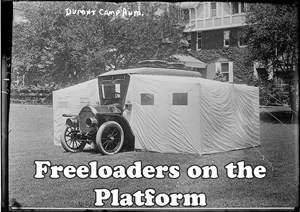
17:46 But I want to talk a little bit about Freeloaders on the platform. Now This is something that I don't think has been talked about before. I couldn't find a good analogy, so maybe this is something that we are seeing emerge, maybe someone else can contradict me. But, we are talking about talking about building a platform that is intended to be used for free and freeloaded off of. I've got two examples of this.

18:10 How many people have Nintendo Wii? How many people have Mario Kart? The Nintendo Wii has a wifi system built in, so it can connect to the internet and normally it just phones home to the mothership so you can check for software updates and simple things like this. But it also has a few games on it like, Everybody votes, so you can talk and submit things. It is basically a webpage, but the nice thing about Mario Kart and I'm sure games in the future are that those games connect to the internet and you get Network Play. So I would argue that you have made a 1 time investment in a piece of hardware, so, I don't know, you shell out a couple hundred Euros for the Wii, but then you are getting the service for free. You're not paying a monthly fee to connect and meet-up with friends and race online. You're not paying any fee for that. So how does this make money? Well, you potentially sell more games. But I also think that it ads to the experience. And that's probably worth the most amount. Because when I connect and want to race somebody, if there is nobody else there, I'm going to go away. So it requires them to have freeloaders on the system and not paying and being available for me to meet online and to race. So it comes back to the whole point that the experience is the most important part, and that is only gained by people freeloading.

19:43 The other example is the new iPhone and iPod touch. This has not been talked about much, but when the next version of the firmware comes out, to do push services, so for your phone to receive information it's going to hold an always on connection to Apple. So your phone is going to have a connection back to Apple and it's going to hold that all the time. Then any information will come down message. Now Apple wants to sell 10 millions iPhones and I don't know how many millions of iPods. That's a lot of connections back to their servers that are being always on and always connected. And once you've paid for that iPhone and you run out your contract. You're not paying any sort of monthly fee to Apple to use this service. So you're freeloading off their information. So that way your applications and your experience can be better. So this is something that we are seeing emerge. The whole platform itself is designed to be freeloaded on. And companies aren't making any money directly on that, it is all from other things, the sales of other devices, or sales of peripherals, or something like that.

21:00
Downloads
- Download Slides: [freeloaders.pdf (5.1 MB)]
- Download Video: [briansuda.mp4 (56.42 MB)]
Last modified: October 11, 2009 14:26:47 UTC
Copyright 2002-©-2024 Brian Sudahttp://suda.co.uk/publications/reboot10/transcript/